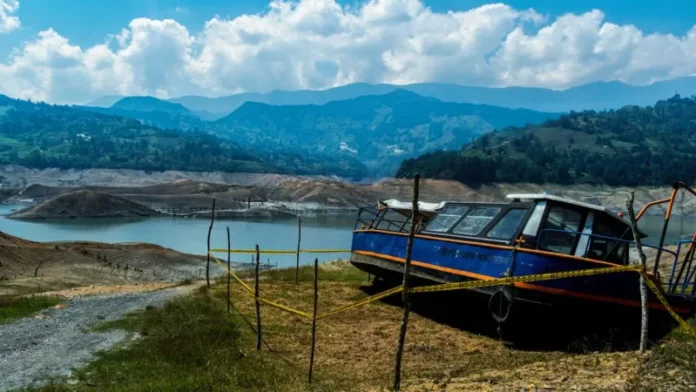A serious lack of rain in Ecuador has caused power cuts because much of the country’s electricity comes from hydroelectric sources.
Energy companies made a schedule for power cuts, leaving the capital and other big cities without electricity for hours.
The drought has also caused water rationing in neighboring Colombia.
This dry weather in the Andean region is linked to a weather pattern called El Niño.
To save electricity, Ecuador’s power companies announced planned power cuts lasting from two to five hours.
The energy ministry explained that several unusual situations, like the drought and higher temperatures, affected Ecuador’s power system.
Colombia stopped exporting energy to Ecuador to focus on its own needs during the drought, making Ecuador’s power shortage worse.
Initially, Ecuador’s energy minister said there wouldn’t be electricity rationing. But after surprise power cuts over the weekend, officials asked energy companies to share a schedule of planned cuts.
Ecuador’s President Daniel Noboa blamed “saboteurs” for making the situation worse but didn’t give details. He threatened severe consequences for anyone involved.
He also fired the energy minister and said there wouldn’t be more blackouts that week.
The new energy minister, Roberto Luque, warned that there aren’t quick fixes for the country’s energy problems.
In Colombia, the lack of rain from El Niño has caused water levels to drop in key reservoirs. Most areas in the capital, Bogotá, have had their water supply limited, and people are asked to keep showers under four minutes. Washing cars excessively could lead to hefty fines.
Certainly!
The situation in Ecuador has worsened due to a prolonged dry spell, causing widespread power cuts as the country heavily relies on hydroelectric power.
Energy companies have implemented scheduled power cuts, leaving major cities including the capital without electricity for several hours at a time.
Neighboring Colombia is also affected by the drought, leading to water rationing in many areas.
The lack of rain is attributed to the El Niño weather pattern, which has disrupted normal weather conditions.
Ecuador’s energy ministry cited various unprecedented factors such as the drought, high temperatures, and low water levels as reasons for the power shortage.
Colombia’s decision to stop exporting energy to Ecuador exacerbated the situation, prioritizing its own needs during the drought.
Initially, Ecuador’s government ruled out electricity rationing but later implemented it after unexpected power cuts.
President Daniel Noboa blamed “saboteurs” for worsening the situation and took action by dismissing the energy minister.
However, he assured the public that there would be no more blackouts for that week.
The newly appointed energy minister cautioned that there are no quick solutions to address the country’s energy crisis.
In Colombia, the impact of El Niño has led to dwindling water levels in key reservoirs, prompting water rationing in Bogotá and restrictions on water usage, including limits on shower times and penalties for excessive car washing.























